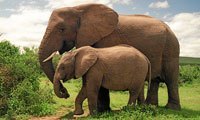
BY JEFFREY MOYO
Just last year, 37-year-old Thembalani Dlodlo lost five cows to lions that invaded his kraal in his home area in Hwange district of Matabeleland North province.
Hwange is home to the popular Hwange National Park in this southern African nation housing thousands of wild animals.
In the vicinity of the national park resides villagers like Dlodlo who have had to endure losing their livestock to stray lions from the park.
“There is nothing I can do to overcome this problem. Lions keep coming at night to attack my cattle, and they scare them until the cows break out of the kraal, giving the lions a chance to attack them,” Dlodlo told Anadolu Agency.
While many like Dlodlo battle to stomach the pain of losing their livestock wealth, wildlife poachers are also giving animals a very difficult time, killing animals like elephants for ivory, with villagers also going on hunting sprees for game meat, threatening to render the game extinct.
According to wildlife conservation experts like Richmond Gwauta, “no one is helping matters in terms of wildlife conservation.
“Poachers are killing animals; animals like lions are also killing people’s livestock and at times villagers themselves, who in turn pounce on game.”
- Chamisa under fire over US$120K donation
- Mavhunga puts DeMbare into Chibuku quarterfinals
- Pension funds bet on Cabora Bassa oilfields
- Councils defy govt fire tender directive
Keep Reading
True to Gwauta’s remarks, over the past few years, the government has been exporting baby elephants, claiming to be raising money for wildlife conservation.
Animal protection experts at the Humane Society International (HSI) have gone on record in the media claiming the exported baby elephants are held in captivity for good in China, where they are caged,.
Suspected cross-border wildlife poachers from neighbouring countries like Zambia have wreaked havoc, killing hundreds of elephants and rhinos for ivory and horns respectively, and through this, according to Gwauta, Zimbabwe has continued to lose millions of dollars in revenue.
And it never rains, too, but pours for ordinary Zimbabweans as they bear the brunt of losing their livestock to dangerous wild animals like lions.
Last year alone, Zimbabwe lost more than 400 cattle to stray lions across areas in the vicinity of national parks, according to the Zimbabwe National Statistics Agency (Zimstat).
Zimstat is the statutory body that was established through Zimbabwe’s Census and Statistics Act of 2007 and the agency is the main source of official statistics in the country mandated to play a coordination and supervisory role within the national statistical system.
But also last year, more than 300 elephants were lost across the country’s national parks due to poaching, according to the Zimbabwe Parks and Wildlife Management Authority (ZimParks).
ZimParks is responsible for conserving Zimbabwe’s wildlife and wilderness resources in national parks, protected areas and on other state-owned land.
Apparently wildlife is on the road to extinction in this country while people and domestic animals like cattle are equally under threat from stray carnivorous animals like lions.
To wildlife conservationists like Elmond Sandura based in Harare, “wild animals, domestic animals and the people are equally in danger, and it is a crisis”.
But while the survival of wild animals and humans is equally endangered in Zimbabwe, even as wildlife dwindle numerically, according to the country’s parks and wildlife authority, Zimbabwe’s population of wild animals is not properly documented.
“Zimbabwe has poor records in terms of its own wildlife population, which as a result it can hardly account for, while at the same time, wildlife faces danger from extinction through poaching amid the worsening human-wildlife conflict here,” a top ZimParks official, who requested to remain anonymous as she is not authorised to speak to the media, told Anadolu Agency.
Even nature has endangered the country’s wildlife, thanks to worsening climate change impacts.
For instance, according to ZimParks, last year, around 200 elephants died due to a lack of food and water, along with scores of buffalo and antelope.
Faced with hunger, not only elephants are straying from parks, but lions as well and other edible animals which subsequently fall prey to poachers, including game hunters.
With bad news mounting amid the human-wildlife conflict, Zimbabwe’s parks authorities since last year recorded that 40 people lost their lives to wild animals, with crocodiles accounting for 25 deaths.
Authorities have played a role in decimating the country’s wildlife, according to figures from Zimstats.
“Zimbabwe has exported nearly 100 elephants, mainly to China, earning US$3 million,” ZimStats showed.
Even as that happens, ZimParks has not benefited from the government, with the organisation requiring US$40 million annually for conservation efforts.
So to independent conservationists like Denis Chouruka, “with organisations like ZimParks responsible for the country’s wildlife lacking funding, this affects both the animals and the people, since without conservation, some dangerous animals stray into people’s habitats, turning on humans themselves and their livestock”.
With minimal wildlife conservation, experts like Chouruka also say edible wild animals are being rendered extinct by ordinary people who illegally ensnare them for food. —Anadolu Agency











